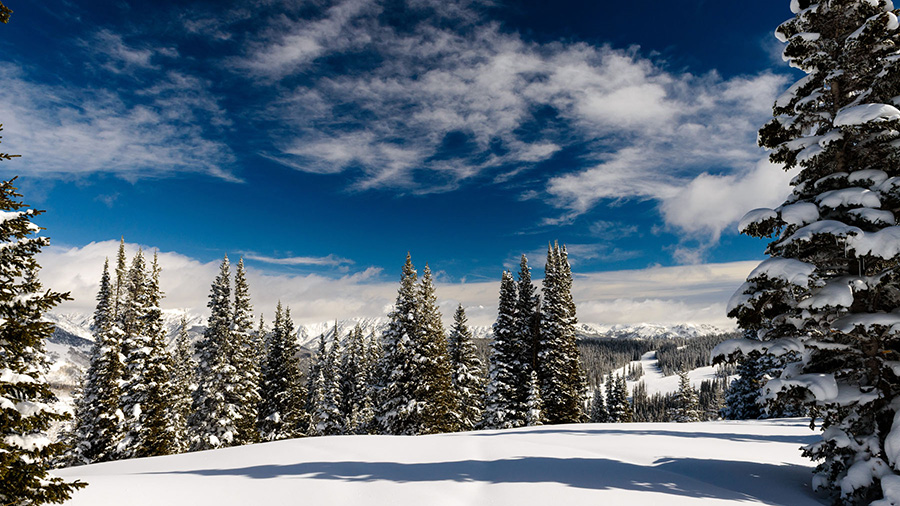Vail Resorts saw a pickup in visitation and spending in March and April to help wrap up a healthy 2022/23 North American ski season, is seeing encouraging early season pass sales for the upcoming season, and believes its ski resorts are positioned well to mitigate many of the impacts of a potential economic downturn.
“In previous downturns, we’ve seen strong resilience in our visitation and our lift revenue because of our strategy to get our guests to commit in advance,” said Kirsten Lynch, CEO, on a quarterly call with analysts. “We have seen some impact historically in downturns on ancillary spend, but actually the commitment in advance has given us a lot of stability through those downturns.”
In the fiscal third quarter ended April 30, net income was $325 million or $8.18 per diluted share, down 12.8 percent from $372.6 million, or $9.16, a year ago. Results were below Wall Street’s consensus estimate of $8.88.
The earnings decline was primarily attributable to an increase in expense associated with a change in the estimated fair value of the contingent consideration liability related to its Park City resort lease.
Resort Reported EBITDA was $623.3 million, up 2.1 percent. Resort earnings were impacted by the timing of recognition of past product revenue as a result of delayed resort openings in the prior year and early resort openings in the 2022/23 North American ski season. This change in resort opening dates resulted in a past product revenue decrease of approximately $40 million for the latest quarter as those sales landed in the fiscal second quarter.
“After the challenges experienced in the second quarter of fiscal 2023, driven by weather disruptions in Tahoe and across our Midwest, Mid-Atlantic, and Northeast resorts, collectively referred to as our Eastern U.S. resorts, the results in March and April improved as expected, with strong demand from local and destination guests, driving visitation, and resort net revenue above prior year record levels,” said Lynch. “Favorable conditions enabled an extended season at resorts across Utah, Tahoe, and the Northeastern U.S., while some resorts in the Midwest and Mid-Atlantic regions closed earlier than originally intended due to unseasonably warm weather and lack of terrain.”
She added, “Our results throughout the 2022/23 North American ski season highlight both the stability that comes from the advance commitment from season pass products and our strong operational execution through the season.”
She said the winter season included significant weather-related challenges from the travel disruptions over the peak holiday period, abnormal weather variability across its Eastern U.S. resorts, and significant storm-related disruptions at its Tahoe resorts during multiple peak periods throughout the season.
“Despite these weather events, the company grew visitation, resort net revenue and Resort Reported EBITDA to record levels, supported by the stability created from our advance commitment strategy, and a strong finish to the season with good spring conditions at our resorts in Colorado, Utah, Tahoe, and the Northeastern U.S.,” said Lynch.
Ancillary businesses, including ski school, dining, and retail/rental, experienced strong growth, compared to the prior year period, when those businesses were impacted by capacity constraints driven by staffing, and in the case of dining, by operational restrictions associated with COVID-19.
Lynch said, “Staffing levels enabled our mountain resorts to deliver a strong guest experience, resulting in a significant improvement in guest satisfaction scores, which exceeded pre-COVID-19 levels at our destination resorts.”
Looking ahead, the strong finish to the 2022/23 North American ski season produced resort EBITDA results that were in-line with expectations. Net income attributable to Vail Resorts for fiscal 2023 is now projected to be between $251 million and $283 million ($282 million and $328 million previously), and resort reported EBITDA to be between $837 million and $853 million ($831 million and $859 million previously).
Looking further ahead, pass product sales through May 30, 2023, for the upcoming 2023/24 North American ski season increased approximately 6 percent in units and approximately 11 percent in sales dollars year over year.
Compared to year-ago levels, Vail Resorts achieved strong unit growth among renewing pass holders. Unit growth was seen across destination, international, and local geographies, with the strongest unit growth in destination markets, particularly in the Northeast. Growth was also seen across all major pass product segments, with the strongest product growth in regional unlimited pass products and Epic Day Pass products “as lower frequency guests and local Northeast guests continue to be attracted to the strong value proposition of these products,” said Lynch.
Pass sales dollars are benefiting from the 8 percent price increase relative to the 2022/23 season, partially offset by the mix impact from the growth of Epic Day Pass products.
“While pass results to date have been strong, we still have the majority of our pass-selling season ahead of us and given our efforts to drive more guests to purchase passes in the spring, we expect the full-year pass sales growth rate may moderate relative to our spring growth rate,” said Lynch.
In Australia, ongoing sales of the Epic Australia Pass, which end on June 14, are up approximately 16 percent in units through June 1 year over year. The passes provide advance commitment for this winter in Australia, but also advance commitment from Australian citizens for North American ski resorts for the 2023/24 winter season.
Among new innovations, Vail Resorts is piloting a new merchandise subscription program, My Epic Gear, at Vail, Beaver Creek, Breckenridge and Keystone Resorts for a limited number of pass holders during the 2023/2024 North American ski season. Costing $50 for the full season, My Epic Gear members will be able to rent skis, snowboards and boots and have the gear delivered to them when they need it, with free slopeside pick-up and drop-off.
Expansion is planned for the 2024/25 season.
Lynch said the My Epic Gear will be supported by Vail’s over 200 retail rental locations, distribution centers and its rental delivery business, Gear Valley Service. She said, “We are investing in gear to be a part of the program, but the life of that gear and our ability to use the gear in My Epic Gear and then also use it through our rental stores makes that also very attractive capital investment for us. And then the intention of My Epic Gear overall is, how do you create loyalty and higher retention within our owned and operated resort network, consistent with our subscription strategy approach.”
Other innovations include the introduction of a new ticketing technology that will enable guests to store their pass product or lift tickets directly on their phone and scan at lifts hands-free. Vail is also launching the My Epic app, which will include Mobile Pass and mobile lift ticket, interactive trail maps, real-time and predictive lift line wait times, personalized stats, My Epic Gear and other relevant guest information.
Vail also announced a number of projects underway at a number of resorts, including at Keystone, Breckenridge, Whistler Blackcomb and Attitash.
Vail’s overall properties include Vail Mountain, Breckenridge, Park City Mountain, Whistler Blackcomb, Stowe, and 32 additional resorts across North America; Andermatt-Sedrun in Switzerland; and Perisher, Hotham, and Falls Creek in Australia.
In the Q&A session of the call, Lynch said she saw the strength in season pass renewals for the upcoming season as an indicator of “strong loyalty” for its resorts.
“Our renewals among existing pass holders are very strong and is the driver of the growth versus prior year,” said Lynch. “We’re seeing growth across all geographies, destination, international, local geographies, also in the Midwest, Mid-Atlantic, and Northeast where there were some challenges, as you know, with conditions and terrain. And we see growth across all major pass product segments. And that includes our high-frequency products, Epic and Epic Local. It also includes our regional unlimited high-frequency products, as well as our limited-frequency products like Epic Day Pass. We saw strong growth across the board.”
Photo courtesy Vail Resorts
















